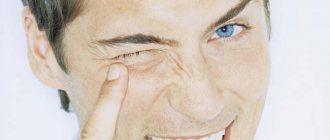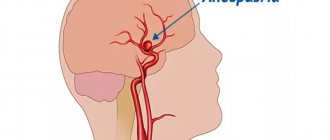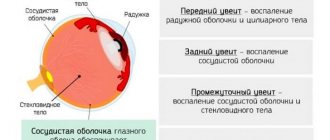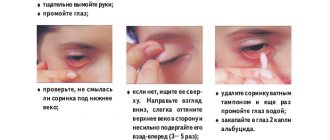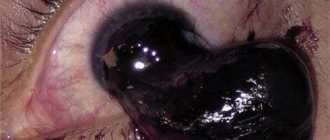Blepharospasm, or eye tic, is an uncontrolled, monotonous twitching of the upper or lower eyelids, in which the nerve impulse transmitted from the eye muscles to the brain functions abnormally. Nerve endings, which are present in large numbers on the face to express emotional feelings, cause twitching of the muscles around the eyes, where the weakest of them are located. A tic of nervous origin in the form of frequent monotonous blinking occurs as uncontrolled movements (hyperkinesis). Often (in nine out of ten cases) this phenomenon is observed due to an overworked state of the body, an emotional explosion, anxiety or stress. Children are more likely to experience blepharospasm than adults.
Eye twitching is not an independent disease, but a widespread symptom of various malfunctions of the central nervous system (CNS). She tries in this way - with small movements around the eyes - to carry out her own restoration. In this case, the patient is sometimes accompanied by a feeling of discomfort, a growing feeling of anxiety, he is worried and does not know what to do about it.
It is important to know! If an eye spasm occurs, you must immediately remove coffee and alcohol from your diet. Vacation, reducing eye strain, proper sleep and nutrition will help to relax the nervous and visual systems, which means that the signs of eye tics will disappear on their own.
But it would be too easy to explain eye tics only by emotional shocks and nervous, tiring work; there are a number of reasons that can cause twitching of one or both eyes at once.
Causes of eye tics
There are primary and secondary eye tics. If the first is associated with overwork of the body as a result of intense mental or physical activity, stress and unfavorable lifestyle factors, then the secondary tic indicates serious pathologies of the nervous system and other symptoms.
With a primary tic, eye twitching occurs rarely and for a short time. In the secondary case, a periodically appearing tic lasts for several hours in a row.
Some of the most common causes of eye twitching include:
- Overfatigue of the visual system. The muscles around the eyelids become tense due to constant long hours of work at the computer, reading in public transport or in poor lighting, and short sleep.
- Significant nervous overload. The impact on the body of constant mental stress and neurosis can lead to pathology. What is important here is a thorough rethinking of the situation that is traumatic to the psyche, eliminating it from the “head”, relaxation and calmness (possibly with the help of a specialist).
- The disease is conjunctivitis. As a result of this pathology, irritation and inflammation of the mucous membrane can provoke eye twitching due to the fact that the manifesting symptoms in the form of “sand” in the eyes causes forced blinking or squinting to ensure better visibility. With this disease, you need to contact an ophthalmologist, otherwise trying to get rid of a blurry image due to conjunctivitis can become a habit, making it difficult to get rid of a nervous tic.
- Various eye diseases (blepharitis, keratitis, etc.). At the first symptoms of blurred vision, which reduces sharpness in the evening, you should consult a specialist to find out the causes of eye strain and twitching.
- Wearing contact lenses. As a result, the cornea and mucous membrane of the eye dry out.
- Long-term use of medications that cause irritation of the mucous membrane of the eyes. As well as the effect of medications that cause adverse reactions on brain activity.
- Inflammatory processes in the eyes, entry of foreign bodies, bacteria with dirty hands when rubbing the eyes. Redness of the mucous membrane, lacrimation, itching, the appearance of dry crusts and discharge on the edges of the eyelids are observed.
- Allergic reactions in the form of itching, redness, twitching and swelling of the fiber located under the skin of the eye.
- Factor of hereditary predisposition. Twitching of the eyelids does not occur under the influence of stressful situations or experiences, but without an obvious reason. True, a tic that appears in childhood goes away with age.
- Parkinsonism, brain tumors, Gilles de la Tourette's syndrome and facial nerve dysfunction known as Bell's palsy. Nervous twitching affects many muscles, spreading to the eyes.
- Vitamin deficiency due to poor nutrition. Magnesium, calcium, glycine, when deficient, cause nervous system disorders in the form of trembling eyes. The situation in this case is aggravated by the abuse of alcohol, coffee, energy drinks and strong black tea.
- Reduced level of immunity. An acute respiratory viral infection or acute respiratory disease can cause eye twitching.
- Disorders of nervous origin. The eyelids twitch due to increased reflex excitability, convulsions and muscle hypertension.
- Poor blood circulation in the brain, arterial hypertension. In this case, you should consult a neurologist and undergo an MRI examination.
- Injuries during childbirth, asphyxia (suffocation), mechanical injuries due to a head injury.
- Great fright.
The regular appearance of a tic, which brings discomfort to a person, should serve as a reason to consult a doctor for medical help. An ophthalmologist or neurologist will determine the causes of the problems.
When should you see a doctor?
What to do if your right or left eye twitches? It is necessary to eliminate the factor provoking this phenomenon. You should contact a medical specialist in the following cases:
- The tic repeats continuously for a week or more.
- The eyelid twitches very strongly, which leads to involuntary closing of the eyes.
- The spasm affects not only the eyelid, but also other facial muscles.
- The eye turned red, swelling and discharge appeared.
- Vision has decreased.
In these cases, you should consult a doctor. The eye twitches for various reasons. Therefore, treatment should be carried out by a doctor of appropriate qualifications. To determine which specialist to contact, you should first visit a therapist. He will help determine the cause of the pathology, and then refer you to a specialized medical specialist.
If there is a suspicion that such a symptom is caused by disorders of brain activity or blood circulation, you will need to visit a neurologist.
If the eye becomes red, swollen or suppurated, you will need to visit an ophthalmologist. If visual acuity decreases, you should also consult an ophthalmologist. In addition, depending on the type of pathology that caused the nervous tic, additional consultation with the following specialists may be required:
- neurosurgeon;
- infectious disease specialist;
- psychotherapist;
- cardiologist;
- endocrinologist
Self-treatment may not only not give positive results, but also cause harm. Therefore, if certain symptoms occur, you should go to the hospital and undergo a comprehensive diagnosis.
Why does the upper or lower eyelid twitch?
The process of eye twitching affects either the upper or lower eyelid. In the first case, this is caused by excessive load on brain activity, a depressed state, constant tension and stress - everything that affects the human emotional sphere. The main thing is to take control of your condition: reconsider your own lifestyle, get enough sleep, relax, and get positive emotions.
In the second case, when the lower eyelid twitches, we can talk about eye fatigue and nervous exhaustion. Strong black coffee in the morning, which affects the central nervous system, can cause eye twitching for a short time.
If there is a signal indicating eye fatigue, you should do the following:
- sit relaxed for 10 minutes with your eyes closed;
- alternate between tightly closing your eyes and opening them wide (do the exercise several times);
- blink your eyes frequently for several seconds;
- apply warm and relaxing compresses to the eyes (slices of fresh cucumbers, slices of raw potatoes, brewed tea bags, chamomile infusion, etc.);
- massage the brow ridges.
It is important to know! You can also use ice to relieve eye fatigue.
Frozen mineral water does this job perfectly. Ice cubes are wrapped in a thin cloth and applied to the eyes for 2 minutes (or less). Under the influence of cold, tense eye muscles weaken and pain disappears. You cannot hold it for more than two minutes, as this can lead to vasoconstriction, which means poor circulation.
Symptoms of eye tics
The presence of blepharospasm can be determined by muscle contraction. Spasmodic manifestations are:
- simple (the eye muscle contracts once);
- complex (muscle contractions occur repeatedly and even over a long period).
Adults are not able to control their condition or predict the occurrence of spasms, since they appear involuntarily. The person himself may not notice the eye twitching, since he does not feel it. Only those around you often point out the presence of such a problem.
In a calm environment, the manifestation of blepharospasm is almost impossible. Provoking factors are emotionally stressful situations, for example, large crowds of people, noise, shouting, fighting, tense atmosphere, etc.
Treatment of eye tics
Malfunctions in the body are expressed through the first sign – a nervous tic.
In this case, it is necessary to take measures and follow the following recommendations, given that the state of health requires increased attention:
- Make it a habit to regularly perform a set of simple exercises to relax the muscles in the eye area. As you inhale, your eyes close tightly, and as you exhale, they open and widen. During a tic attack, the exercise is repeated up to seven times;
- use sedative herbal formulations or medications (drops or tablets) that eliminate neuroses;
- sleep 8-9 hours at night (it is advisable to go to bed early - before 11 pm);
- take breaks of a quarter of an hour every hour or two during the working day, alternating them with eye exercises;
- Avoid being near the TV or computer during spasms;
- avoid communicating with people who negatively affect your emotional state and cause anxiety;
- change your diet, strengthening it with a pharmaceutical complex of vitamins and products containing vitamin B, calcium and magnesium (watermelon, buckwheat, beans, bananas, dried apricots, nuts, hard cheese, fish, prunes, cottage cheese, sunflower seeds and whole grain bread);
- to walk outside;
- Use special eye drops to moisturize and relieve redness and tension.
| You can apply a light massage to the area under the eye |
How to treat nervous tic of the eye
Depending on the cause that provokes the nervous tic, there are various methods for eliminating involuntary eye movements.
Let's look at the most effective and common of them.
Exercise for the eyes
The first way to stop a nervous tic is to treat a nervous tic of the eye using eye exercises:
- First of all, you need to close your eyes as much as possible, and then open them sharply. You need to repeat these movements until tears begin to flow from your eyes.
- Then you need to start massaging the lower part of the eye, and after all the exercises done, it is advisable to blink for about 30 seconds.
- After blinking, close your eyes halfway, hold them in this position until the slight trembling passes, and after that, start blinking your eyes for about a minute.
This simple eye exercise will help you get rid of nervous tics only for a while, so it is not suitable as a primary treatment.
What else can you do if you are suffering from a nervous eye tic?
There are such methods:
- You can also use various sedatives as ways to get rid of nervous tics. These can be a variety of herbal tinctures, vitamins or herbal remedies.
- Probably the most effective way to combat this problem is, of course, healthy sleep and proper rest.
- In order to get rid of nervous tics, you can practice relaxation. To do this, you need to lie down in a comfortable position, close your eyes and begin to make movements with your lips, as if you were pronouncing the sound “Y”, while imagining that drops of warm summer rain are running down your face. After such procedures, the nervous tic disappears.
- You can also use essential oils. Oils will help relieve tension and irritability, which in turn will help you relax and forget about all your problems and troubles for a while.
In order to overcome this disease, you need to adhere to a special diet, which consists of the following products:
- hazelnuts, peanuts and other types of nuts;
- soy;
- strawberry;
- cherry;
- dill;
- parsley;
- milk, cheese and other fermented milk products;
- tuna, pork, poultry, rabbit;
- bran bread;
- cocoa;
- dried apricots, raisins;
- buckwheat.
You need to exclude tea and coffee from your diet.
As for the treatment of nervous tics, it can be either medicinal or traditional medicine.
Is there a modern and effective method that can be used to cure obsessive-compulsive disorder? Dyscirculatory encephalopathy of the brain - what can cause the disease, what treatment methods exist and how to prevent the pathology you can learn from our article.
How to stop nervous eye tics with medication?
In drug treatment, the following medications are used for nervous eye tics: calcium, Botox injections, botulinum toxin A - a product that helps reduce muscle excitability, as well as sedatives.
ethnoscience
How and whether it is possible to cure a nervous tic of the eye with the help of folk recipes and advice.
As for traditional medicine, it is characterized by the following types of treatment for tic:
- hardening;
- taking a bath with sea salt;
- taking tinctures of various healing and soothing herbs;
- swimming;
- honey lotions;
- taking motherwort;
- taking peony or chamomile tincture.
You should also follow a number of rules that will help you avoid the appearance of nervous eye tics:
- you need to sleep at least 8 hours a day;
- engage in swimming or other active sports;
- walk daily in the fresh air for at least 2 hours;
- meditate or listen to relaxing music;
- In stressful situations, you need to inhale and exhale deeply, trying to calm yourself.
Treatment with folk remedies
Folk remedies designed to alleviate the condition of a person suffering from eye tics are used for primary hyperkinesis. The use of folk remedies in the treatment of a twitching eye is not prohibited by doctors, you just need to consult with them, which is suitable in each specific case, taking into account the causes of blepharospasm. One of the most famous remedies is a tea drink made from valerian rhizomes . Five grams of crushed rhizomes are poured into a glass of boiling water. Leave in a sealed container for 2-4 hours. Then add 30 ml of infusion with water to obtain a volume of 150 ml. Take three cups of the resulting tea daily.
Infusions of peony, motherwort, mint, and lemon balm are also good for calming the nervous system . Chamomile and fennel are brewed together using equal portions of herbs with the addition of two parts licorice. One tablespoon of the mixture is brewed with boiling water, kept on the fire for 10 minutes and filtered. Both adults and children can drink this tea, a large spoon twice or thrice a day. Not only infusions of lemon balm and chamomile help with eye tics, but also compresses using these medicinal herbs. A popular folk remedy for eye tics is geranium leaves . A freshly cut leaf is applied to the eye during a tick. The twitching goes away.
Important to remember! Only a neurologist, after a thorough examination, will find out the cause of the symptom and make a diagnosis. Self-medication in case of discomfort when an eye tic occurs without consulting a doctor can lead to a worsening of the condition and the emergence of complications that are fraught with consequences for the entire body.
Prevention of trembling of the left and right eyes
Prevention of the disease comes down to reducing stressful situations, establishing proper sleep and nutrition. It is also necessary to monitor the health of the organs of vision, circulatory system and immune system of the body.
To prevent blepharospasm, it is useful to take freshly squeezed juices from plant petals during their flowering period (yarrow, calendula, cinquefoil, St. John's wort). Drink juice an hour before meals, 1 tsp. 3 times a day.
This remedy improves blood circulation in the brain, relaxes spasming muscles and has a comprehensive calming effect.
Useful video
Why does the eye twitch - upper or lower eyelid?
Treatment of ocular hyperkinesis with medications
If the use of traditional medicine and special exercises to relieve fatigue, in which the eye twitches, is ineffective, eye drops are used that resist dryness and can moisturize the mucous membrane.
Among them, the most effective was the use of:
- "Oxiala".
- "Artelaka".
- “Hilozar-chest of drawers” and others.
In case of allergic effects on the occurrence of eye tics, taking drugs that do not cause drowsiness and do not impair psychomotor functions has proven effective, namely:
- "Loratadine."
- "Telfasta".
- "Zodak" and others.
The doctor can also prescribe vitamin complexes, microelements and sedatives that can strengthen the nervous system. Severe cases will require the use of antipsychotics and tranquilizers. Doses and course are as prescribed by a specialist, self-medication is excluded. Autogenic training, meditation, yoga, acupuncture, massage can be an alternative option for drug treatment.
It should be noted that serious cases of the disease require long-term therapy, so only timely consultation with a doctor will give a favorable prognosis.
